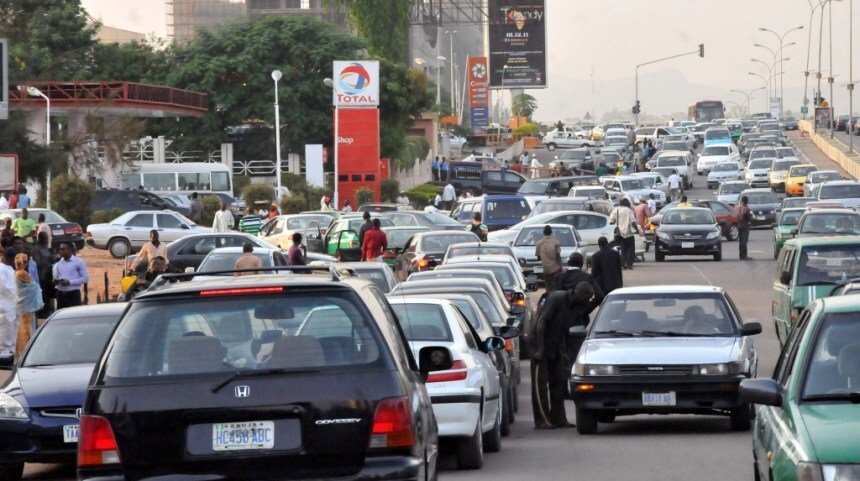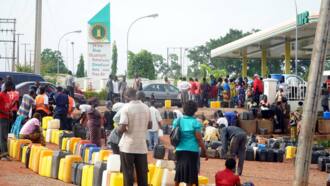Fuel Scarcity: Long Queues Resurface in Abuja as Black Marketers Sell for N300 Per Litre
- Black marketers are cashing out big time as long queues have resurfaced in Abuja in filling stations
- This is as the marketers are offering the product at a higher rate causing untold hardship to the people in the nation's capital
- Meanwhile, most filling stations in Abuja have been shut down following the sudden scarcity of petrol
PAY ATTENTION: Click “See First” under the “Following” tab to see Legit.ng News on your Facebook News Feed!
Fuel queues persisted in the Federal Capital Territory on Monday as filling stations struggled to control desperate drivers waiting to buy the Premium Motor Spirit (PMS), at the official price.
Racketeers had a field day, selling a litre of PMS at N300 in different parts of the FCT.
In Kubwa, a litre of fuel went as high as N320, rising to N400 in Asokoro and other prime parts of Abuja, The Punch reports.

Source: Facebook
One of the racketeers, who identified himself as Usman, said he stored fuel in several gallons, with the belief that fuel would be scarce at some point in the future.
Do you have a groundbreaking story you would like us to publish? Please reach us through info@corp.legit.ng!
Another racketeer, Bala, claimed that he was still selling his reserves.
He said:
“When there is scarcity, I buy from some filling stations at night. I usually pay extra N200 or more for a 10-litre gallon. I buy at N2000 and sell N3,500.”
The plight of commercial drivers
Vehicle drivers told the news outlet that they spent between two and four hours at various filling stations before buying PMS.
A commercial vehicle driver, George Akinsanya, said he spent three hours at Oando Filling Station opposite the NNPC depot in Abuja before buying the PMS.
Fuel queues have become a recurring decimal in Nigeria, especially the FCT. In the first quarter of the year, fuel scarcity disrupted economic activities, leading to an increase in inflation to 15.92 per cent, from 15.70 per cent.

Read also
Exercise Books, Textbooks, other Print materials to Become more Costly as Cost of Paper Imports hit N1.23trn
Earlier, most filling stations in Abuja and neighbouring states of Nasarawa and Niger that dispensed Premium Motor Spirit, popularly called petrol, were on Sunday greeted with long queues.
Legit.ng gathered that many other outlets were shut as they claimed not to have products to dispense, a development that led to the crowding of the filling stations that dispensed the commodity.
NNPC reacts
Meanwhile, the Nigerian National Petroleum Corporation has ascribed the sudden appearance of fuel queues in parts of Abuja to low loadouts and increased purchases that characterise post-holiday periods.
In a statement, the spokesman for NNPC, Garba Deen Muhammad, said on Monday, May 9, that the company had sufficient fuel supplies to satisfy the demands of Abuja residents for over six weeks.
The statement partly read in part:
“The NNPC Ltd notes the sudden appearance of fuel queues in parts of Abuja. This is very likely due to low loadouts at depots which usually happen during long public holidays, in this case, the Sallah celebrations.”
He assured all residents of the FCT and Nigerians that NNPC had ample local supplies and national stock in excess of 2.5 billion litres, with the sufficiency of more than 43 days.
But the Chief Executive Officer of the Centre for Promotion of Private Enterprise, Dr Muda Yusuf, urged the Federal Government to deregulate the industry to avoid long queue recurrences.
Fuel scarcity drives up the price of diesel
Meanwhile, Legit.ng previously reported that fuel scarcity had driven up the price of diesel to N550 per litre.
Buyers interviewed by Legit lamented the ripple effect of the hike in petroleum products in the country.
Michael Agwu, a businessman told Legit.ng in Lagos that what the price increase means is that it will further drive up inflation in the country.
Agwu said:
“We know that the price of crude oil has risen due to the Russia-Ukraine war but it should not impact heavily on the domestic market. What it also means is that household income will suffer, low-income earners will grapple to make ends meet.”
Source: Legit.ng


